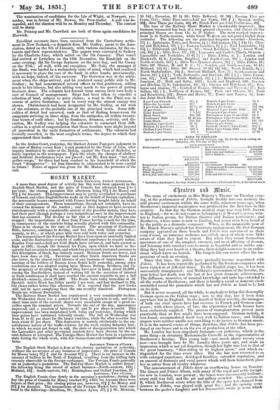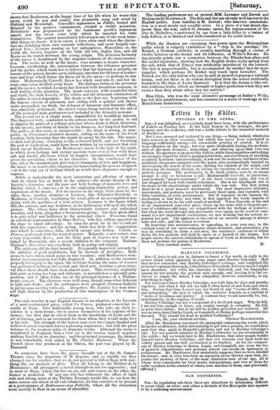ttratrrs and Zusir.
The scene of excitement in Her Majesty's Theatre on Tuesday even- ing, at the performance of Fidelie brought freshly into our memory the still greater excitement within the same walls, nineteen years ago, when Beethoven's immortal masterpiece was produced for the first time in this country. In that day the German musical stage was very little known in England,—for we do not count as belonging to it Mozart's operas, writ- ten to Italian poems, for Italian theatres and Italian performers ; and Beethoven, whose name is now so familiar, had never even been heard of by the public as a dramatic composer. When, in the memorable year of Mr. Monck Mason's spirited but disastrous management, the first German company appeared on these boards and Fiddle was announced as their coup d'essai, an immense audience assembled, most of whom were little aware of what they had to expect. But when they found themselves spectators of one of the simplest, sweetest, and most affecting of dramas, and listening with ravishel ears to music so beautiful and so unlike any- thing they listening ever heard in a theatre, their delight soon rose to an enthu- siasm which knew no bounds. The longest life can never efface the im- pressions of such an evening. Since that time, the public have gradually become acquainted with Fidelio. It has been repeatedly performed by the German companies who have visited us at different times. To the English stage, too, it has been successfully transplanted ; and Malibran's personation of the heroine, the year before her death, was the last of her great dramatic achievements. The diffusion, moreover, of musical knowledge and taste has extended to all the works of Beethoven • and there is hardly a social or domestic circle assembled round the pianoforte which has not Fiddle at hand to be laid on its desk.
But it never occurred, all the while, to anybody to bring this thoroughly German opera on the Italian stage; nor, to this day, has it been done anywhere but in England. In the dearth of Italian novelty, the managers of both our rival operas have had recourse to French and German coin- ' posers ; with whose pieces, of late, the rdpertoires of both houses have been exclusively supplied. The process of transplantation proved more practicable than at first might have been supposed. German melody, it was found, accommodated itself very well to Italian verse ; and Italian singers were neither unable nor unwilling to do justice to German music. It is in the natural course of things, therefore, that Fiddle has been pro- duced at one house and is on the eve of production at the other.
Mr. Lumley has been singularly fortunate—or judicious, which is the same thing—in obtaining Mademoiselle Cruvelli as the representative of Beethoven's heroine. This young lady—not much above twenty even now—was brought here by Mr. Lumley three years ago, and made an impression which is not yet forgotten, though her light was lost in that of the great luminary, "then riding in its highest noon," and which ex- tinguished for the time every other. But she has now returned to us with enlarged experience, developed faculties, extended reputation, and an amount of dramatic and vocal power which will from henceforth place her in safety from all rivalry whatever.
The announcement of Fidelio drew an overflowing house on Tuesday. The Queen and Prince Albert, with many of the royal and noble foreign-
ers now in London, were present ; the boxes were uncommonly brilliant ; every stall was full, and the pit and gallery crowded. The overture in E, which Beethoven wrote when the title of the opera was changed from
Leonora to Fidelio, was played with great fire ; and the opening scene between the gaoler's daughter and her disconsolate swain (a scene which shows that Beethoven, at the happy time of his life when he wrote this opera, could be gay and comic) was pleasantly sung and acted by Giuliani and Mereuriali. Cruvelli's appearance as Fidello, heated and fatigued by the gaoler's commissions, created a visible sensation. Everybody was prepossessed by the handsome youth's ingenuous aspect, and the sweet voice with which he reported his little transactions. The quartet immediately following is one of the moat beau- tiful things we know : it is in canon, a form often used when the charac- ters are indulging their own separate reflections, and most happily em- ployed here ; Leonora musing on her unhappiness, Marcellina on the youth she fancies, Jaquino on the little jilt who slights him, and old Rocco on the match between the young couple. The delicious harmony of the voices is heightened by the singular richness of the instrumenta- tion. The scene, as well as the music, soon assumes a deeper character. Leonora, overhearing the conversation between the villanous governor and the gaoler, which leads her to believe that her husband is actually an inmate of the prison, breaks out in soliloquy, intothat fervid burst of tender- ness and hope which forms the finest air in the opera—or perhaps in any other. Mademoiselle Cruvelli threw her whole soul into it, and her in- tense expression thrilled every heart. The dialogue between the governor and the gaoler, to which Leonora has listened with breathless suspense, is well worthy of the situation. The music conveys, with wonderful force and truth, the dark ferocity of the villain and the reluctant submission of his softer-hearted dependent. The finale to the first act, beginning with the famous chorus of prisoners, and ending with a quintet and chorus quite unequalled, we think, for richness of harmony and dramatic effect, was admirably performed; the choral voices being enriched by the aid of all the principal male performers not included in the dramatis personae.
The second act is a single scene, unparalleled for breathless interest. The disguised wife, conducted to the prison-vaults by the gaoler, to aid in digging the grave of a solitary prisoner whose doom is fixed, discovers, in the spectre, perishing of famine in his dungeon, her long-lost husband. The pathos of this scene is inexpressible ; the heart is wrung, in sym- pathy, by Florestan's plaintive accents, calling on the name of his loved Leonora, little knowing that she stands in agony by his side. The music, so dark and gloomy, sounding so like a funeral knell, and yet breathing the soul of tenderness, could have been written by no composer that ever lived except Beethoven ; for Beethoven's music is the type of his mind, in which stern feelings and stormy passions were ever at war with those soft and kindly affections which in happier circumstances would have given the prevailing colour to his character. In the conclusion of the tale, when the reunited pair give way to transports of love and happiness, the music is an inarticulate language far transcending the powers of speech —it is the very cry of feelings which no words have eloquence enough to express.
Fidello is undoubtedly the most interesting and affecting of operas. And its charm lies as much in the subject—the divine beauty of the heroine's character, and the pure and holy feelings of domestic love and fidelity which it conveys—as in the surpassing originality, power, and expression of the music. For its success on the stage, there must be, be- sides these, another element—a Leonora, like Schroeder-Deviient, or Malibran, or Cruvelli, combining the vocal gifts of an accomplished mu- sician with the qualities of a true actress. Leonora is the figure which fills the canvass, and any weakness in its delineation will spoil the whole picture. The others have their characteristic features and individual beauties, and form altogether a harmonious group ; but their great effect is to give relief and brilliancy to the principal object. Florestan found an excellent representative in Sims Reeves, who has seldom appeared on the stage to equal advantage : he sang the great air in the second act with fine expression ; and his acting, while free from the exaggeration into which he sometimes falls, showed energy and feeling. Coletti, as Pizarro, performed with his wonted power. Balanchi, a new comer, was a very respectable Rocco; and the little part of Japan° was well sus- tained by Mereuriali, also a recent addition to the company. Madame Giuliani's Marcellina was excellent, both in acting and singing.
The orchestra did its duty bravely. It is greatly improved, not only by the addition of good performers, but by increase of discipline. Balfe seems to have taken much pains on this occasion ; and Beethoven's won- derful instrumentation was fully displayed. In addition to the overture properly belonging to the opera, the overture bearing the name of Leonora was performed between the second and third acts, creating a great inter- val when there should have been almost none. This overture, originally laid aside as being too long and elaborate, is nevertheless a splendid corn- position, and it often forms one of the principal features of a Philhar- monic concert. The choruses were well sung, though somewhat deficient in light and shade ; and the performers were grouped (German fashion) in picturesque moving tableaux. Altogether, Mr. Lumley has done him- self high honour by the production of this masterpiece of the German stage.



























 Previous page
Previous page